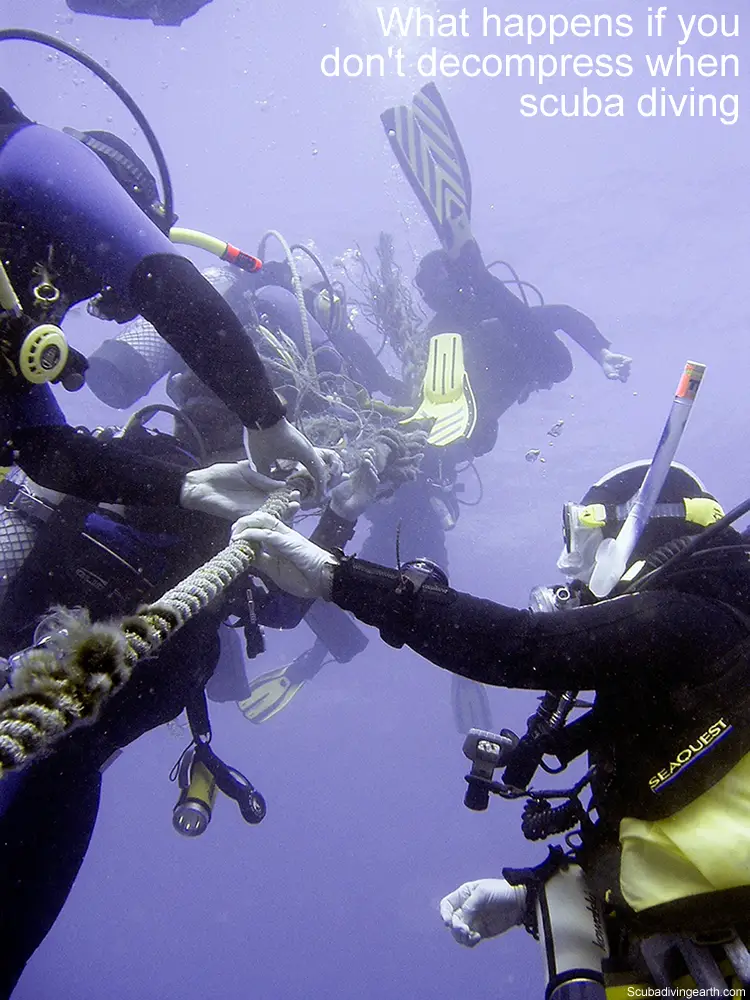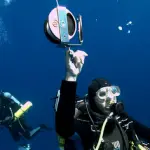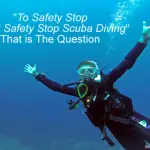
Why do you have to decompress when diving?
Diving and decompression go hand in hand. You can’t have one without the other, as every dive is a decompression dive. But not everyone agrees with me. Let me explain further.
What happens if you don’t decompress when scuba diving? If you don’t decompress when scuba diving you will end up with decompression sickness, which can be fatal. All dives are decompression dives, which means you should always ascend slowly after a dive and where appropriate carry out decompression stops. As a safety precaution you should also perform a safety stop too.
The best way to do more diving and to practice your ascents, is to book yourself on a scuba diving liveaboard. You can check the latest and best deals on liveaboards using the following window:
What happens if you don’t decompress when scuba diving in more detail?
Most recreational diving limits scuba divers to diving depths of 40 metres (131 feet) or less.
Also, and unless you are suitably advanced train, most recreational scuba divers don’t do ‘decompression stop diving‘, which is to prevent their bodies from taking on to much nitrogen which it can’t off-gas enough during a direct ascent to the surface.
However, advanced divers dive beyond the no decompression stop dive limits. This means on their ascent from a dive they are required to stop to allow additional time to decompress. Each decompression stop allows time for gas to move out of the tissues and back to the lungs.
On ascent, the absorbed nitrogen is released or off-gassed, but if a diver comes up too fast and if the pressure reduction is sufficient, the excess gas may come out of solution and form bubbles.
These bubbles may lead to decompression sickness. Which in the worst case scenario is a debilitating or a life-threatening condition.
Therefore if you don’t decompress when scuba diving, if you ascend too quickly (even without the requirement for decompression stops), you’ll end up with the bends or decompression sickness!
That’s why I say that ‘all dives are decompression dives‘, as you need to decompress as you ascend each time you dive.
More Reading: What Is It Called When A Diver Comes Up Too Fast (+17 Tips How To Avoid DCS)
What is decompression in diving?
The decompression of a diver happens on an ascent from a dive. This is because of the reduction in the ambient pressure experienced during the ascent from depth.
The ‘ambient pressure‘ on a diver is the pressure of the surrounding water which is in contact with his body. If you weren’t aware already, the deeper you go underwater, the higher the pressure.
For example, at just 10 metres (33 feet) the pressure a diver experiences is twice that experienced at atmospheric pressure, i.e. the pressure you’re experiencing right now as you read this article.
But of course, as a diver ascends back to the surface, this pressure reduces down once more until they reach the surface and are at atmospheric pressure once again.
In other words, from 10 metres to the surface the pressure halves.

Nitrogen dissolves into the body tissues under increased pressure
The largest percentage of the air we breath is nitrogen, or 78%. As the pressure increases around you, the amount of nitrogen that is dissolved into your bodily tissues and blood increases.
As the largest percentage of air (which is what most divers breath underwater) is nitrogen, this is what get’s dissolved the most.
More Reading: How Deep Can You Dive Without Decompression (No Decompression Stop Limits)
The amount of nitrogen that’s dissolved into your body increases minute by minute. So the longer a you’re underwater, the more nitrogen is dissolved. But also, the deeper you dive, the greater the amount of nitrogen is dissolved at a faster pace.
That means that you’ll need longer for the dissolved nitrogen to be released, i.e. longer to decompress. Which is done as you ascend to the surface. By the way, this applies to each and every dive that you do.
This process is referred to as off-gassing. And this needs to be done slowly to avoid problems associated with decompression sickness, or the bends.
More Reading: Can You Die From The Bends? (Dysbarism Treatment)
Once you’ve surfaced you’ve not finished decompressing
Just because you’ve surfaced from a dive doesn’t mean that’s the end of your decompressing. This is one of the reasons why I always stress how important it is to look upon every dive as a decompression dive.
If you don’t realise you are still decompressing on the surface, noting that this is even if you’ve not done a decompression stop dive, and you were to fly immediately, you may end up with decompression sickness.
More Reading: 12 Decompression Sickness Risk Factors In Scuba Diving and How to Avoid Them
In this case what happens if you don’t decompress first before flying, is you could ‘fizz-up‘ and die! Please take a moment to read the following article on how long you should wait after scuba diving before you fly.
More Reading: How long should you wait to fly after scuba diving? (What’s safe?)
I hope you enjoyed this article about what happens if you don’t decompress
I’d love to hear from you. Tell us about your adventures of diving and snorkeling, in the comments below. Please also share your photos. Either from your underwater cameras or videos from your waterproof Gopro’s!
If this article hasn’t answered all of your questions. If you have more questions either about snorkeling or scuba diving (or specifically about what happens if you dont decompress), please comment below with your questions.
There will also be many more articles about scuba diving (and snorkeling) for you to read and learn about these fabulous sports.
Have fun and be safe!
More Reading: Emergency Decompression Stop vs Safety Stop (What’s The Difference?)




